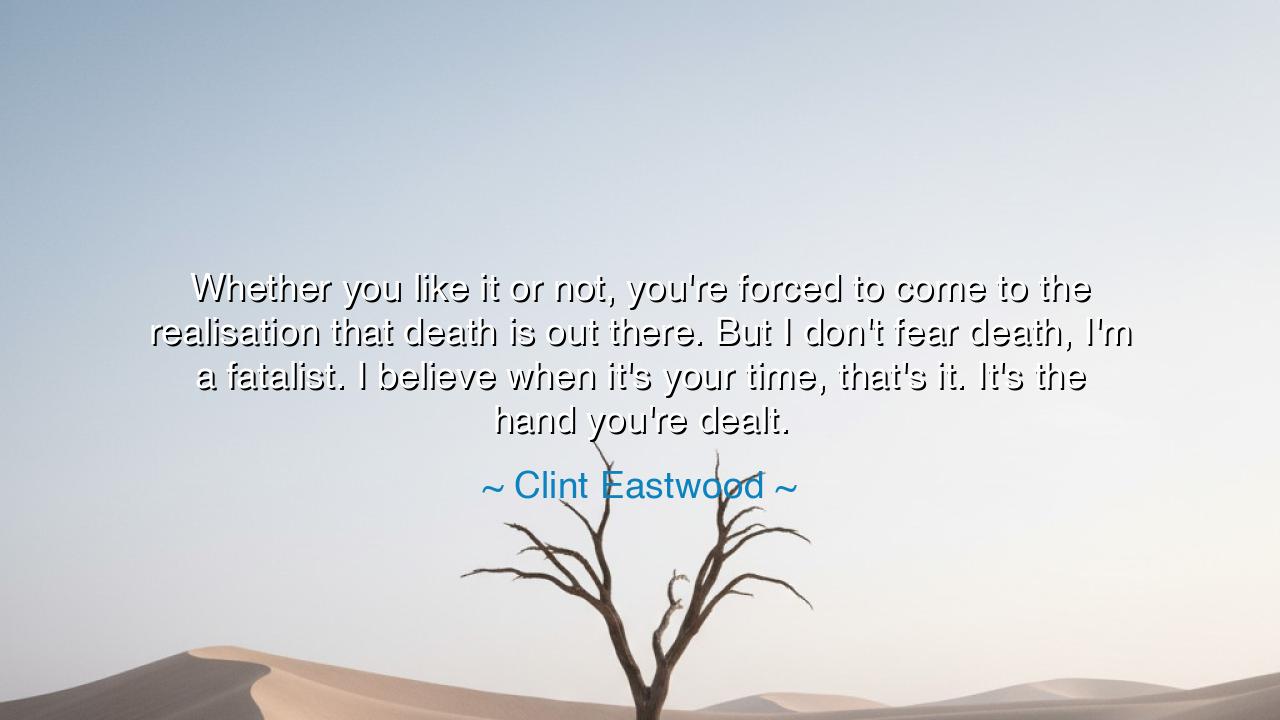
Whether you like it or not, you're forced to come to the
Whether you like it or not, you're forced to come to the realisation that death is out there. But I don't fear death, I'm a fatalist. I believe when it's your time, that's it. It's the hand you're dealt.






“Whether you like it or not, you're forced to come to the realisation that death is out there. But I don't fear death, I'm a fatalist. I believe when it's your time, that's it. It's the hand you're dealt.” Thus spoke Clint Eastwood, a man whose life has been shadowed by both danger and destiny. In these words echoes the timeless wisdom of warriors, philosophers, and poets—the understanding that death is not the enemy, but the companion of life. To live fully, one must acknowledge its presence; to live fearlessly, one must make peace with it. Eastwood’s philosophy is not one of surrender, but of acceptance: a recognition that the hand you’re dealt is yours to play with courage and calm, without illusion or fear.
The ancients knew this truth well. The Stoics—those philosophers of strength and serenity—taught that fate rules all, and that wisdom lies not in resisting it, but in embracing it. Marcus Aurelius, emperor of Rome, wrote: “Do not act as if you were going to live ten thousand years. Death hangs over you. While you live, while it is in your power, be good.” Eastwood’s fatalism is of that same lineage. He does not bow to despair but to reality, knowing that each life is a brief spark in the vast night of time. The wise man does not curse the darkness; he uses the light he has been given to see clearly, to act decisively, and to live with integrity before the flame goes out.
In his long life, Clint Eastwood has stood face to face with danger, both in his youth as a soldier and in his art as a storyteller of mortality and justice. He has portrayed the gunslinger, the outlaw, and the aging hero—all figures who know that death rides close behind. Yet his words are not those of a man haunted, but of one reconciled. He knows that to deny death is to live half a life. To accept it, on the other hand, is to live freely, without cowardice or regret. His fatalist view is not cold detachment—it is the quiet strength of one who has seen enough to know that life’s meaning is not found in its length, but in the courage with which it is lived.
Consider the tale of Achilles, the hero of Greek legend, who was told he had two choices: a long and obscure life, or a short one crowned with glory. Achilles chose the latter, not because he longed for death, but because he understood that fate cannot be avoided, only embraced. He walked into battle knowing his end was near, but he did not flinch. Like Eastwood’s creed, his courage lay not in conquering death, but in refusing to let its certainty define his spirit. To be a fatalist, in the truest sense, is not to surrender—it is to stand tall beneath the weight of destiny, saying, “When my hour comes, I will meet it standing.”
This understanding breeds freedom. The one who fears death lives as a prisoner, measuring every step, bargaining with time. The one who accepts it walks unchained. He is not reckless but serene, knowing that each day is a gift already paid for by the promise of its end. Eastwood’s words carry that calm authority—the voice of a man who has looked mortality in the eye and continued forward, steady as ever. The hand you’re dealt cannot be changed, but how you play it—that is the measure of a life. To curse your fate is to waste it; to play it well is to transcend it.
The ancients often compared life to a game of dice or cards. The gods deal the hand, but character decides how it is played. Epictetus, the philosopher-slave, taught: “Remember that you are an actor in a drama, of such a kind as the Author chooses. If he wishes it to be short, it is short; if long, it is long. Your task is to play your part well.” Eastwood, in his rugged simplicity, speaks this same truth in modern tongue. We do not control the length of our story, but we control its tone—whether it is one of bitterness or of quiet courage, fear or faith.
So, my child, take this teaching to heart: do not fear death, but let it remind you to live. Accept that fate is the river, but your soul is the oar. When loss comes, when the unknown looms, remember that the hand you’re dealt is neither curse nor blessing—it is the invitation to play bravely, wisely, and with grace. Make each day a worthy wager. Laugh, create, forgive, and love without hesitation. For when your time comes, as it surely will, let death find you not hiding in fear, but walking toward it with a steady heart—knowing, as Eastwood does, that the trip was brief, but the game was good, and the hand well played.






AAdministratorAdministrator
Welcome, honored guests. Please leave a comment, we will respond soon